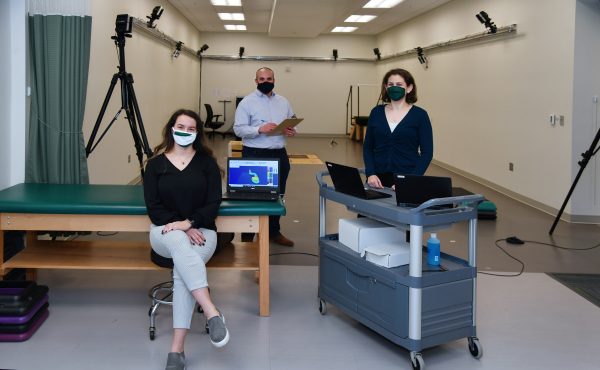Athletic Training Program Advocates for Women Researchers In the Sciences

By: Abbey Thomas Fenwick, assistant professor, Department of Kinesiology
Over the past decade research has revealed the gender-bias in scientific fields. Women are underrepresented in health and scientific publication author lists. Women account for less than 40% of all lead or senior authors publishing research in major scientific and healthcare journals. And female-authored manuscripts are less likely to be cited than those written by their male counterparts.
Those statistics were eye-opening to the faculty members of the Biodynamics Research Laboratory in the Department of Kinesiology at UNC Charlotte. So, when the invitation to submit a manuscript featuring women scholars in the field of athletic training presented itself last year, we jumped on it.
March is both National Athletic Training Month and Women’s History Month, so the upcoming March edition of the Journal of Athletic Training will solely feature women scholars in our field.
Our laboratory group focuses on understanding how injuries to the knee and ankle joints affect factors such as muscle strength and movement quality in order to develop effective treatment strategies to optimize long-term physical health.
One of the main injuries that this lab group studies is chronic ankle instability, best described as recurrent instability in the ankle after an initial ankle sprain injury has occurred. Leading the charge on much of our work in people with chronic ankle instability is doctoral candidate Danielle Torp.
Danielle’s most recent work, “Biomechanical Response to External Biofeedback During Functional Tasks in Individuals with Chronic Ankle Instability,”examined strategies for changing the way people move to reduce their risk of sustaining an ankle sprain. She found that if people receive auditory or visual biofeedback, they are capable of changing their movement patterns in real time to reduce their injury risk.
“For an athletic trainer, ankle sprains are by the most common and the hardest injury to rehabilitate. Once I made the decision to pursue a Ph.D., I was looking for two criteria: 1.) I wanted my research to focus on rehabilitation strategies for musculoskeletal injuries and 2.) the faculty mentors I would be working with needed to be a good fit,” Torp said.
“My advisor, Professor Luke Donovan, is supportive and aware of the challenges women face in our field. He has never guided me away from an opportunity because I am a woman and I appreciate everything he has done to support me. Professor Abbey Thomas and Professor Tricia Hubbard-Turner are both exemplary female scientists and I admire the path they have set before me. As a female athletic trainer and a Ph.D. candidate, I find it empowering to work alongside other women. The research our lab has been doing over the last three years is laying the groundwork for future athletic trainers to be successful and I am truly honored to be a part of this group.”
Even in a female-dominant field like athletic training, males are still more prominently featured in the coveted lead/senior author positions in research publications. We are excited to be included in the efforts to mitigate this gender-bias, but as mentors we are proud to share this opportunity and teaching moment with the next generation of female scholars.
Abbey Thomas Fenwick is an assistant professor in the Department of Kinesiology; Learn more about the Biodynamics Research Laboratory or follow on Twitter.
Photo: Danielle Torp, Luke Donovan and Abbey Thomas Fenwick.